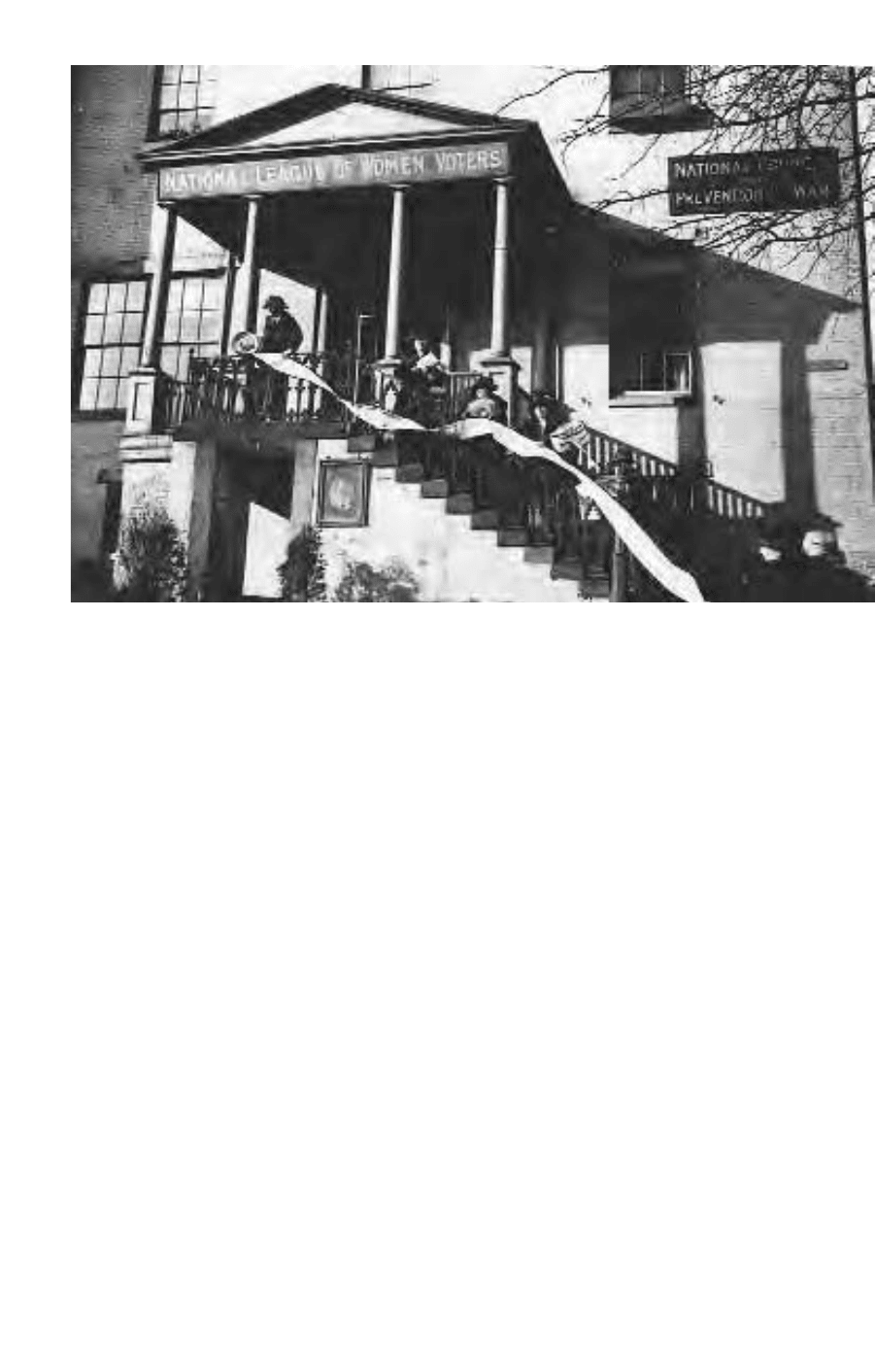Schenken Suzanne O’Dea. From Suffrage to the Senate: An Encyclopedia of American Women in Politics (2 Volumes)
Подождите немного. Документ загружается.


Kuhn, Margaret (Maggie) E. (1905–1995)
A founder and the convening president of the Gray Panthers, Maggie Kuhn
became an advocate for older Americans after her forced retirement when
she was sixty-five years old. As she searched for a way to continue working,
she met with other social activists who had been or were soon to be forced
into retirement. In 1970, the Gray Panthers emerged from those gatherings.
Kuhn advocated “fundamental social change that would eliminate injustice,
discrimination and oppression in our present society.” She sought a legal
prohibition against mandatory retirement, supported publicly owned and
democratically controlled utilities, and advocated health insurance paid to-
tally by the government. She led efforts for regulation of the hearing aid
and nursing home industries, presented position papers to the American
Medical Association, and testified before congressional committees on the
fragmentation of services for the elderly. Regarding a welfare reform bill,
she told a congressional committee:“Public welfare in this country does not
need reforming; it needs radicalization. To merely rearrange the out-dated,
unworkable concepts of the Elizabethan Poor Laws is not a solution.”
Born in Buffalo, New York, Kuhn earned her bachelor of arts degree
from Flora Stone Mather College of Case Western Reserve University in
1926. She continued to write, travel, and lecture until her death at the age
of eighty-nine.
References H. W. Wilson, Current Biography Yearbook, 1978 (1978); New York
Times, 23 April 1995.
Kunin, Madeleine May (b. 1933)
Democrat Madeleine Kunin was governor of Vermont from 1985 to 1991,
served as deputy secretary of the U.S. Department of Education from
1993 to 1996, and became U.S. ambassador to Switzerland in 1996. Her
political journey began in 1972 with an unsuccessful campaign for alder-
man in Burlington, Vermont, but later that year she won election to the
Vermont House of Representatives. Her platform included educational,
environmental, and poverty issues. After serving three terms in the legis-
lature, Kunin was elected lieutenant governor in 1978. She won in 1978
and was reelected in 1980.
Kunin ran for governor in 1982, lost, and then won when she tried
again in 1984. With her success, she became Vermont’s first woman gov-
ernor and only its third Democratic governor in 130 years. After being re-
elected in 1986 and in 1988, she became the first woman governor in the
nation to win three terms in office. When Kunin began her first term, the
state had a deficit, but after eighteen months in office, she announced that
the state budget was in the black. She also equalized education spending
Kunin, Madeleine May 385

across the state, obtained an increase of 25 percent in the education
budget, expanded child care subsidies, and passed a measure for kinder-
garten for all Vermont children. In other areas, she improved groundwa-
ter protection, established a state mini-Superfund, and created a new ru-
ral enterprise zone and a state venture capital corporation.
Following Bill Clinton’s 1992 election as U.S. president, Kunin
served as a member of his transition team. In 1993, President Clinton ap-
pointed her deputy secretary of education. Her responsibilities included
serving as the Education Department liaison with the White House and
other agencies.
Born in Zurich, Switzerland, Kunin had fled to the United States with
her brother and widowed mother in 1940 to escape the Nazi regime and
its threats to Jews. She earned her bachelor of arts degree from the Uni-
versity of Massachusetts in 1956, her master of science degree from Co-
lumbia University in 1957, and her master of arts degree from the Uni-
versity of Vermont in 1967.
Kunin published Living a Political Life in 1994.
See also Governors, Women; State Legislatures, Women in
References H. W. Wilson, Current Biography Yearbook, 1987 (1987); Kunin,
Living a Political Life (1994); New York Times, 7 April 1993.
386 Kunin, Madeleine May

La Flesche, Susette (1854–1903)
The first woman to speak for Native Americans’ rights, Susette La Flesche’s
Native American name was Inshta Theumba, or “Bright Eyes.” Born in an
Omaha Indian village in Nebraska, she graduated from the Elizabeth In-
stitute in about 1873 and returned home to teach.
La Flesche became involved in Native American rights in the late
1870s, after federal policies forced Ponca Indians to leave their homeland
and move to Oklahoma, where almost one-third of them died. Initially, La
Flesche served as an interpreter for Ponca Indian chief Standing Bear when
he toured the eastern United States to develop public support for his
tribe’s plight. Wearing Native American clothing and using her native
name, La Flesche created a dramatic presence and emerged as an articulate
and eloquent speaker. Her descriptions of the injustices inflicted upon Na-
tive Americans inspired others, including Helen Maria Fiske Hunt Jackson
and Mary L. Bonney, to begin their work for Native Americans’ rights.
The most widely known Native American woman of her time, La
Flesche provided testimony at U.S. Senate hearings regarding the Ponca In-
dians in 1879 and 1880. She continued to lecture in the United States and in
England throughout the 1880s. Toward the end of the decade, her lectures
contributed to the passage of the Dawes Act of 1887, authorizing the allot-
ment of land to individual Native Americans. Native Americans who ac-
cepted individual allotments of tribal or public lands immediately became
citizens. The allotments, however, were controversial because they were bur-
dened with several restrictions on their use and ultimately made it easier for
387
L

non-Indians to acquire the land. Congress passed the Indian Citizenship Act
in 1924, granting all Native Americans United States citizenship.
In 1902, La Flesche moved to an area near Bancroft, Nebraska, living
on the land allotted her as a tribal member. She died there in 1903.
See also Bonney, Mary Lucinda; Bonnin, Gertrude Simmons
References Hardy, American Women Civil Rights Activists (1993).
LaDuke, Winona (b. 1959)
One of the most prominent Native American environmental activists in
North America, Anishinabeg tribal member Winona LaDuke believes that
the primary native women’s issues are the survival of indigenous commu-
nities and preservation of the environment. To further those goals,
LaDuke founded the White Earth Land Recovery Project in Minnesota, a
multifaceted endeavor. The project purchased and holds in trust 1,300
acres of land, a minuscule part of the original 836,000 acres of the White
Earth Reservation pledged to Anishinabeg Indians in an 1867 treaty. The
project has also been involved in economic development, setting up a
marketing collective that encourages local processing of wild rice as well
as a diaper service. That has alleviated the need for disposable diapers,
saved users money, and reduced the sanitation problems in the local
dump. The project also sponsors a literacy program in the Ojibwe lan-
guage of the Anishinabeg, with the goals of making the language more
commonly used and of gaining its recognition as an official state language
by the State of Minnesota.
LaDuke founded the Indigenous Women’s Network (IWN) in 1985,
a coalition of 400 native women activists and groups. The IWN advocates
the revitalization of indigenous languages and cultures, sponsors interna-
tional forums, and supports local projects. In 1996, LaDuke was the Green
Party’s candidate for vice president.
Born in Los Angeles, California, Winona LaDuke earned her bache-
lor of arts degree from Harvard University in 1982 and her master of arts
degree from Antioch College in 1989.
References Paul and Perkinson, “Winona LaDuke” (1995).
Lampkin, Daisy Elizabeth Adams (ca. 1884–1965)
African American Daisy Lampkin was national field secretary for the Na-
tional Association for the Advancement of Colored People (NAACP) in
the 1930s and 1940s. She helped establish chapters all over the United
States, increased membership to the highest levels of the time, and raised
money for the organization’s antilynching campaign. Lampkin entered
politics as president of Pittsburgh’s Negro Women’s Suffrage League in
388 LaDuke, Winona

1915. She became active in civil rights issues through the National Associ-
ation of Colored Women, serving as its national organizer and chairing its
executive board. She was also active in the Republican Party, working for
the Women’s Division in the 1920s.
Lampkin’s work with the NAACP began in Pittsburgh in the 1920s,
when she served on its executive committee and headed a membership
campaign that attracted 2,000 new members and revitalized the branch.
She joined NAACP’s staff in 1930 as a regional field secretary until 1935,
when she was appointed national field secretary. She resigned from the
post in 1947 because of fatigue. She continued to serve on the NAACP
board of directors and to conduct local fund-raising and membership
drives, until she collapsed after giving a speech in 1964.
Born in Washington, D.C., Lampkin attended public schools in
Reading, Pennsylvania. She was a partner in and vice president of the
Pittsburgh Courier.
See also Antilynching Movement; Civil Rights Movement, Women in the;
National Association for the Advancement of Colored People, Women in the;
National Association of Colored Women; Suffrage
References Hines, Black Women in America (1993); Sicherman and Green, eds.,
Notable American Women: The Modern Period (1980).
Landes, Bertha Ethel Knight (1868–1943)
The first female mayor of a large U.S. city, Bertha Landes was mayor of
Seattle, Washington, from 1926 to 1928. Landes, who had initially op-
posed woman suffrage, came to believe that cities were similar to families
and that the details of municipal housekeeping required women’s influ-
ence. During her tenure as mayor, she worked to reduce lawlessness and
to provide services to the community.
Born in Ware, Massachusetts, Landes graduated from Indiana Uni-
versity in 1891 and married two years later. She and her husband moved
to Seattle in 1895, and she became actively involved in the city’s women’s
clubs. As president of the Seattle Federated Women’s Clubs from 1920 to
1922, her duties included managing an exhibit of Washington manufac-
turers, which gained her recognition throughout the business community
and expanded her visibility.
After winning a seat on the city council in 1922, Landes worked for
the elimination of fire hazards, liquor law enforcement, greater efficiency
in government, and regulation of dance halls. Elected president of the city
council in 1924, she was then required to serve as acting mayor in the
mayor’s absence. When Mayor Edwin Brown left Seattle for an extended
period of time, Landes went into action. She told the police chief to re-
move corrupt police officers, but he refused, and she replaced him with a
Landes, Bertha Ethel Knight 389

police chief who raided lotteries, closed speakeasies, and confiscated slot
machines.
Using law and order as her campaign theme, Landes challenged
Brown in the 1926 mayoral election. After defeating Brown, Mayor Lan-
des hired a new police chief, brought area law enforcement officials to-
gether, and negotiated jurisdictional disputes in order to reduce crime.
She replaced corrupt members of the Civil Service Commission and the
Public Works Board. She implemented traffic safety measures and ex-
panded the city’s parks and its power and water systems. Landes lost her
reelection bid in 1928, but the publicity from her one term as mayor cre-
ated a demand for her as a speaker, and she went on several national
speaking tours.
See also Public Offices, Women Elected to
References Haarsager, Bertha Knight Landes of Seattle (1994).
Landrieu, Mary (b. 1955)
Democrat Mary Landrieu of Louisiana entered the U.S. Senate on 3 Janu-
ary 1997. Senator Landrieu’s primary legislative priority is education, in-
cluding full funding for Head Start, more federal money for classroom
computers, and tax credits for college tuition. She supports greater en-
forcement of equal pay laws and improved access to job training pro-
grams. Landrieu wants to establish a research and technology partnership
between the federal government and the private sector to help farmers.
Mary Landrieu served in the Louisiana House of Representatives
from 1980 to 1988 and was state treasurer from 1988 to 1996. An unsuc-
cessful candidate for governor in 1995, Landrieu won the 1996 Senate race
390 Landrieu, Mary
Senator Mary
Landrieu (D-LA) in
1996 became the first
woman elected to
the Senate from
Louisiana (Associ-
ated Press AP)

with a margin of 5,788 votes. Her Republican opponent alleged that wide-
spread voter fraud was involved and petitioned the Senate for a new elec-
tion. The Senate Rules and Administration Committee investigated the
election and reported that there had been isolated incidences of fraud,
some election irregularities, and improper record keeping, but those mat-
ters had not affected the election outcome. The committee ended its in-
vestigation on 1 October 1998, concluding there was not enough evidence
that further investigation was warranted.
Born in Arlington, Virginia, Landrieu grew up in a political family:
her father, Moon Landrieu, was mayor of New Orleans and U.S. secretary
of housing and urban development in the Carter administration. She re-
ceived her bachelor of arts degree from Louisiana State University in 1977.
See also Congress, Women in; State Legislatures, Women in
References Congressional Quarterly, Politics in America 1998 (1997); “Lack of
Evidence Brings Probe of Senate Election to an End” (1997).
Langley, Katherine Gudger (1888–1948)
Republican Katherine Langley of Kentucky served in the U.S. House of
Representatives from 4 March 1927 to 3 March 1931. Langley entered pol-
itics as vice chairperson of the Kentucky State Central Committee, serving
from 1920 to 1922, and was the first chair of the Kentucky Woman’s Re-
publican State Committee in 1920. Her husband John Langley was a
member of the U.S. House of Representatives from 1907 until he was con-
victed of conspiring to transport and sell liquor and sentenced to a federal
penitentiary in 1926. After he forfeited his congressional seat, Katherine
Langley sought to vindicate her husband by running for it.
As a member of Congress, Katherine Langley passed legislation re-
sponsive to the social and economic needs of her low-income con-
stituency, advocated the creation of a cabinet-level department of educa-
tion, and supported women’s issues. She convinced President Calvin
Coolidge to grant her husband clemency on the condition that John Lan-
gley never again seek public office. Within a short time and without
telling his wife, however, John Langley announced his intention to run in
1930 for the congressional seat that she held. Having already filed for re-
election, Katherine Langley refused to withdraw from the election. The
notoriety surrounding the family cost her a third term. From 1939 to
1942, Katherine Langley was a railroad commissioner for the State of
Kentucky.
Born in Madison County, North Carolina, Katherine Langley gradu-
ated from Woman’s College in Richmond and then attended Emerson
College of Oratory in Boston. She taught expression at Virginia Institute
until she left to become her father’s congressional secretary.
Langley, Katherine Gudger 391

See also Congress, Women in; Willebrandt, Mabel Walker
References James, ed., Notable American Women, 1607–1950 (1971); Office of
the Historian, U.S. House of Representatives, Women in Congress, 1917–1990
(1991).
Lathrop, Julia (1858–1932)
The first woman to head a major federal agency, Julia Lathrop was ap-
pointed head of the Children’s Bureau by President Howard Taft in 1912.
Lathrop entered politics as a social reformer, moving into Chicago’s Hull
House in 1890. The governor of Illinois appointed her to the state’s Board
of Charities in 1893, a position she used to investigate the state’s 102
county farms. She resigned from the board in 1901, was reappointed in
1905, and remained on it until 1909. The office gave her the opportunity
to develop support for the first juvenile court in the United States.
After Congress passed legislation creating the Children’s Bureau in
1912 and Lathrop became its head, she directed investigations of infant
mortality, maternal mortality, child labor laws, and related issues. She ex-
plained that she wanted to make the bureau “a great national clearing-
house for information regarding the welfare of children.” She helped pass
the Sheppard-Towner Maternity and Infancy Protection Act of 1921, and
then poor health forced her retirement.
Born in Rockford, Illinois, Lathrop earned her bachelor’s degree
from Vassar College in 1880.
See also Addams, Jane; Children’s Bureau; Sheppard-Towner Maternity and
Infancy Protection Act of 1921
References Lindenmeyer, “A Right to Childhood”: The U.S. Children’s Bureau
and Child Welfare, 1912–1946 (1997).
Lawrence Textile Mill Strike
The Lawrence, Massachusetts, textile mill strike of 1912 began as an unor-
ganized walkout that quickly involved almost 25,000 workers. The catalyst
for the strike was a Massachusetts law that reduced children’s workweeks
from fifty-six hours to fifty-four hours and that became effective on 1 Jan-
uary 1912. The mill decided to reduce all employees’ workweeks to fifty-
four hours, a decision that concerned adult employees because they feared
that their pay would also be reduced. When employees received their pay on
11 January, they discovered that their wages had been reduced and began
walking out. They demanded a pay increase of 15 percent, the fifty-four-
hour week, and double pay for overtime, as well as that strikers be rehired
without discrimination. The strikers appealed to the American Federation
of Labor’s United Textile Workers Union for assistance, but it refused. They
next called on the Industrial Workers of the World (IWW), which sent
392 Lathrop, Julia

them organizers and strategists, including Elizabeth Gurley Flynn. The
IWW leadership placed women in positions of authority, and women had
equal votes with men when making decisions regarding the strike.
Scattered skirmishes between strikers and police escalated into vio-
lence, resulting in the militia’s involvement and more violence. Strike
leaders sought to protect women and children from the militia’s attacks
and recommended that they remain home and stay out of the picket lines.
Instead, a pregnant striker announced that police were less likely to attack
women and children, and she encouraged women to remain on the picket
lines and men to stay home. Her assumptions proved to be wrong. When
she and other women picketed, they were beaten. The pregnant woman’s
child was later delivered stillborn, a death attributed to the beating.
As the strike continued, strikers worried about their children’s safety
and struggled to provide them with food and other necessities. To alleviate
the problems, union members and supporters in New York City agreed to
house the children until the end of the strike. When the first group of chil-
dren arrived in New York, newspapers publicized their plight, providing at-
tention that angered employers. As a way to support employers, Lawrence
city officials declared that no further evacuations would be permitted.
When a group of mothers defied the order and prepared to place their chil-
dren on a train, police arrested and beat some of the women and children.
The continued publicity prompted mill owners to settle the strike in
mid-March 1912. The agreement included wage increases and other pay
concessions, a fifty-four-hour workweek, and time-and-a-quarter for
overtime. Strikers were rehired.
Women were given primary credit for the strike’s success. Their
courage, commitment, discipline, and leadership helped sustain the effort
until their points had been won. Women also gained a new sense of power
and new experiences as leaders by holding positions of authority.
See also Flynn, Elizabeth Gurley; Shirtwaist Workers Strike
References Foner, Women and the American Labor Movement: From the First
Trade Unions to the Present (1982); Wertheimer, We Were There: The Story of
Working Women in America (1977).
League of Women Voters
Founded in 1919 through the leadership of suffragist Carrie Chapman
Catt, the League of Women Voters (LWV) emerged from the National
American Woman Suffrage Association (NAWSA) as ratification of the
Nineteenth Amendment appeared imminent. A nonpartisan organization
with a strong emphasis on education and research, LWV works at the lo-
cal, state, and national levels to influence public policy in four areas: good
government, social policy, civil rights, and natural resources.
League of Women Voters 393

LWV’s early leaders sought to educate new women voters through cit-
izenship schools that offered classes in marking ballots and held political ed-
ucation institutes. In addition to providing political education, LWV soon
became involved in lobbying state legislatures and Congress for a wide range
of public policy issues. The league’s initial agenda included support for pro-
tective labor legislation for women, maternal and infant medical care, inde-
pendent citizenship for women, an end to discriminatory governmental
policies, tariff revision, enforcement of antitrust laws, creation of a federal
department of education, and U.S. membership in the League of Nations.
Working with the Women’s Joint Congressional Committee in 1921,
LWV had its first legislative success with passage of the Sheppard-Towner
Maternity and Infancy Protection Act, which provided federal aid for ma-
ternal and infant care. Other early successes included passage of the Cable
Acts giving women independent citizenship, the Packers and Stockyards
Control Act, and the Civil Service Reclassification Act; the creation of the
Women’s Bureau in the Department of Labor; and the construction of a
federal women’s prison. In the 1920s, LWV affiliates succeeded in passing
laws on the state level that granted women equal guardianship over their
minor children, gave married women the right to make contractual
agreements without their husbands’ consent, and gave women the right to
hold public office.
Also in the 1920s, LWV led several local campaigns supporting city
394 League of Women Voters
League of Women
Voters activists, at
their national
headquarters,
revealed a mile’s
worth of signatures
they had gathered on
a petition (Library of
Congress)
